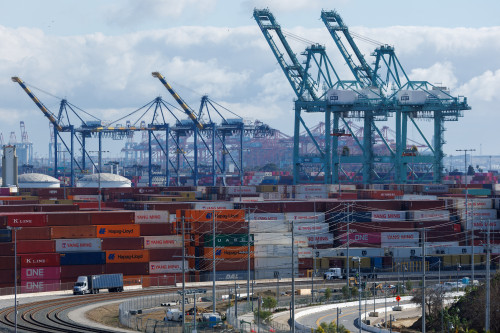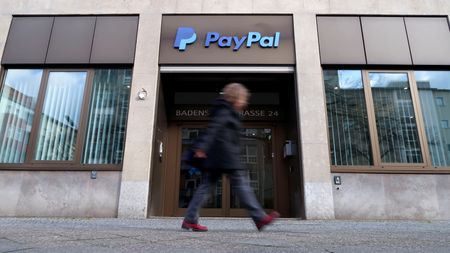By Lisa Baertlein
LOS ANGELES (Reuters) – Imports to the busiest U.S. seaport could drop as soon as May, as companies pause orders in response to President Donald Trump’s escalating tariffs on China and other trading partners, Port of Los Angeles Executive Director Gene Seroka said on Friday.
Trump this week hiked tariffs on China-made goods to 145%.
The adjacent ports of Los Angeles and Long Beach are the most exposed to the boiling trade war between the two largest global economies. Those Southern California ports are the preferred entry gates for goods from China, which is the No. 1 source of imports at each.
“Global trade will slow as companies try to figure out what this means,” said Seroka, who also reiterated his forecast for imports at the Port of Los Angeles to fall at least 10% in the second half of this year.
“It may be more than that, we just don’t know,” Seroka said.
U.S. imports have surged to near-record levels this year as U.S. companies stockpiled goods ahead of expected Trump tariffs.
Now, those same importers are putting orders from China on hold. They hope cooler heads will prevail and that tariffs will be reduced.
U.S. import bookings on massive container ships dropped 64% from March 24-31 to April 1-8, the week when Trump announced “reciprocal” tariffs on a swath of countries, container-tracking software provider Vizion said. Imports from China fell 36% during that period – before Trump cranked up China tariffs and paused “reciprocal” tariffs that exceeded 10%, according to that data.
On Wednesday, Seroka said the Los Angeles port handled 385,531 20-foot equivalent units (TEUs) in March, 1.6% more than the year earlier, as frontloaded cargo continued to flow in.
China accounts for 45% of its import volume at the port.
Exports dropped 15% to 122,975 TEUs in March, sparking concerns for the port’s agriculture and manufacturing exporters as retaliatory tariffs begin taking hold, Seroka said.
China on Friday slapped duties of 125% on U.S. goods and called Trump’s tariff hikes a “joke”. At the same time, China retail giant JD.com launched a fund worth more than $27 billion to help that country’s exporters find domestic buyers for their goods.
“Buckle up, this is going to get really bumpy for us,” Seroka said.
(Reporting by Lisa Baertlein in Los Angeles; Editing by Deepa Babington and Andrea Ricci)




